TOM LEONARD: How the Left’s obsession with wokery and race is turning New York into a crime-ravaged, drug-infested nightmare
Give us pizza or give us death!’ So chanted New Yorker Scott LoBaido a few weeks ago in downtown Manhattan before he started hurling large slices of pizza over the gates of New York’s City Hall.
LoBaido, a conservative artist and activist, was staging a lone and eccentric protest against a new green crackdown on coal and wood-fired ovens.
Opponents say it will badly hit the city’s already struggling small businesses — particularly its iconic pizzerias — which face paying tens of thousands of dollars to install oven filters that must be regularly inspected.
It may seem like a trivial issue. Yet the video of LoBaido’s pie-slinging stunt, in which he tells viewers that ‘the woke-a** idiots who run this city are doing everything in their power to destroy it’, quickly went viral.
And there is clearly a widespread and growing sense that New York — the Big Apple, the City That Never Sleeps and Capital Of The World — is missing some of its old swagger.
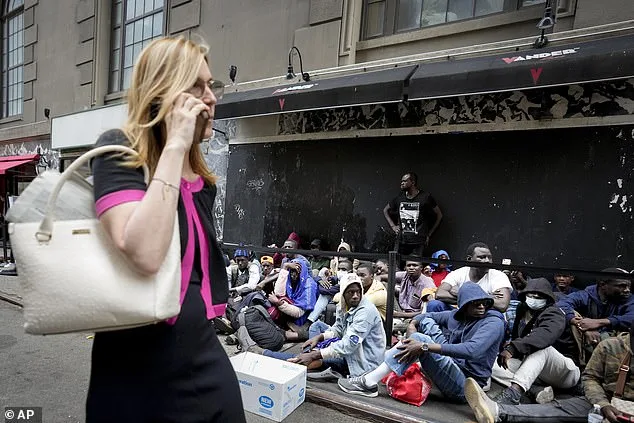
Its notoriously opinionated and hard-bitten inhabitants are increasingly cowed by progressive leaders, who have more than wood-fired pizza in their sights. As a result, the exhilarating and endlessly enterprising metropolis, about which Frank Sinatra sang, ‘If I can make it there, I’ll make it anywhere’ — and where I’ve lived for 16 years — is suffering from something of an identity crisis.
The city is suffering a crime epidemic so bad even ice cream and laundry detergent are security- tagged in shops, and endless anti-business measures are driving down earnings, but politicians appear more preoccupied by the culture wars: woke causes and green issues, such as air pollution.
Yet for all the concern about air quality, the authorities have only themselves to blame for the all-pervasive stench of contraband weed on its streets, a consequence of officials’ disastrous tinkering with cannabis legalisation on the grounds of ‘racial equity’, which has led to the proliferation of 1,400 illicit marijuana shops.
And a city that prides itself on being the ultimate temple of capitalism now finds itself with 22 per cent of its office space lying empty, a stunning figure that is likely to get worse following the introduction of a congestion charge of up to $23 (£17.60) for driving into midtown Manhattan.
If officials hope the fee will encourage commuters to leave their cars at home and take the subway, they may be in for disappointment.
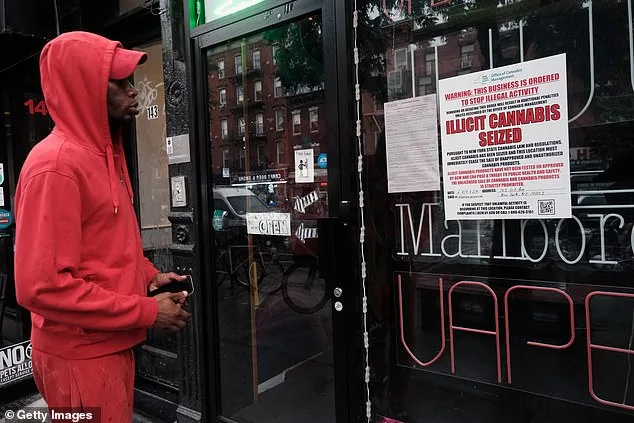
The city is plagued by crime, particularly assaults and robberies, and nowhere is this more evident than in the subway.
Two weeks ago, even Alvin Bragg, Manhattan’s Left-leaning District Attorney and the chief architect of a controversial criminal justice policy aimed at keeping down jail numbers that has seen crime rates soar, admitted: ‘When one of my family members gets on the train, I, too, get a knot in my stomach.’
Now wealthier people tend to avoid travelling on it altogether, leaving everyone else to deal with the menace of thousands of invariably mentally ill, sometimes violent, displaced people who call the network ‘home’.
Indeed, the homeless population now sits at a staggering 100,000 — a majority of whom are black — in a city where ‘progressive’ experts long ago persuaded politicians that the severely mentally ill are better off outside hospitals than in them.
Last year City Hall said it would remove any homeless people who behaved in an ‘unsafe’ manner from the subway, but reportedly dropped the plan because the shelters where it planned to house them are full of the migrants and asylum-seekers pouring into the city, most from Latin America and Africa, and often bussed in from southern states after crossing the Mexican border.
This week, the world’s richest city suffered the embarrassment of pictures emerging of scores of them lining the streets in Manhattan and sleeping shoulder-to-shoulder as they wait to be processed.
New York has run out of indoor space, including expensive hotel rooms, to house a 90,000-strong influx of migrants since last spring.
City leaders have complained to President Joe Biden about their migrant crisis but New York has only itself to blame, having introduced a raft of policies that make it a hugely attractive destination.
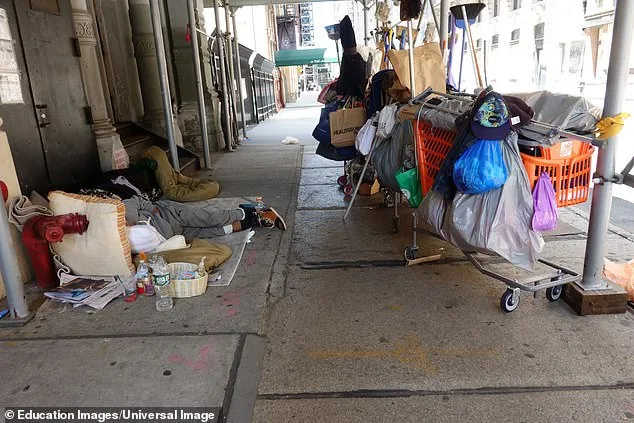
These include providing the country’s only guaranteed ‘right to shelter’ for anyone who asks for it, generous benefits for asylum seekers such as free healthcare, housing and food, and being a ‘sanctuary city’ that refuses to enforce federal immigration law which would lead to deportations.
Critics of such generosity run the risk of being dubbed racist. And allegations of racism are rarely far below the surface in New York’s public discourse.
In June, a white former U.S. Marine named Daniel Penny was charged with killing a black homeless man, Jordan Neely, whom he’d put into a chokehold after Neely began behaving threateningly on a subway train.
The episode provoked a furious debate, with some dismissing claims that Penny had simply been trying to protect fellow travellers and accusing him of being a ‘white supremacist’.
All things considered, it’s little surprise that demoralised police — who were lambasted across the U.S. during the Black Lives Matter protests — are leaving the NYPD in droves and the department is struggling to replace them.
Meanwhile, officers are so often seen spending their subway shifts huddled together in packs, poring over their phones, that they have become figures of fun.
Some speculate that they’ve given up bothering to enforce the law because they know anyone they arrest is likely be released without charge.
Nearly a third of all shoplifting arrests last year involved the same 327 people, who were often re-arrested thousands of times, according to New York police.
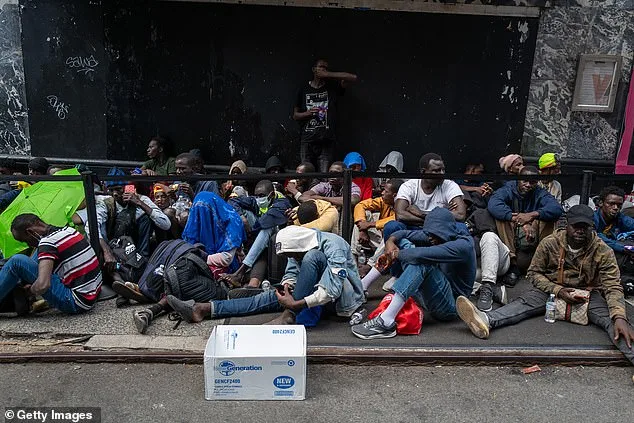
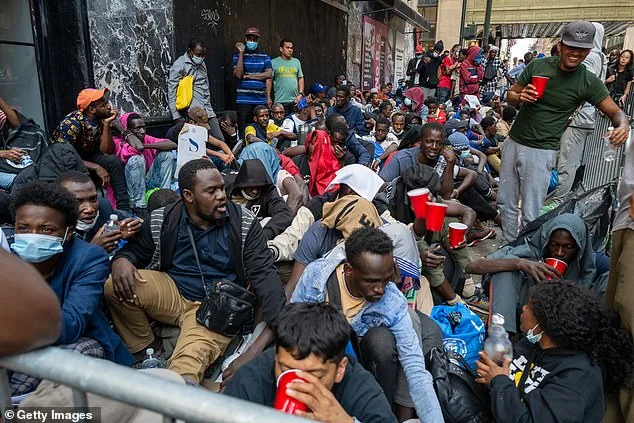
This despite the fact that the city’s current Democrat mayor, Eric Adams, is a tough-talking, black former police captain, who was largely elected on a ticket that he would cut rising violent crime.
While murders and shootings have declined, serious assaults, robberies and burglaries have all surged, contributing to a 22 per cent increase in the incidence of major crimes in 2022 over the previous year.
What worries New Yorkers most is that so much crime seems random and unpredictable, committed by the mentally disturbed who after being arrested are often just allowed back on to the streets to do it again.
Well-heeled New Yorkers recently bombarded a phone-in on the city’s public radio station with calls about buying ‘bullet-proof hoodies’ and the legality of carrying taser guns.
The U.S. incarcerates a greater proportion of its population than any country. And progressive Democrats fervently believe that only systemic racism explains the disproportionate number of black and Hispanic people behind bars.
This orthodoxy, say critics, has had deeply damaging consequences for crime and public safety in New York.
A policy of ending cash bail (on the grounds it discriminates against the poor) has forced judges to free criminals who commit relatively minor offences.
These include shoplifting, which is now rampant. It seems as if a new product is added to the list of items that have to be locked away or security-tagged in stores almost every month — supermarkets are now fitting anti-theft locks to $6 tubs of Haagen-Dazs.
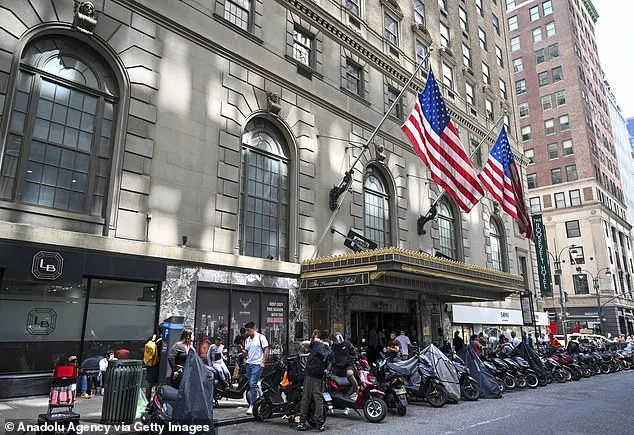
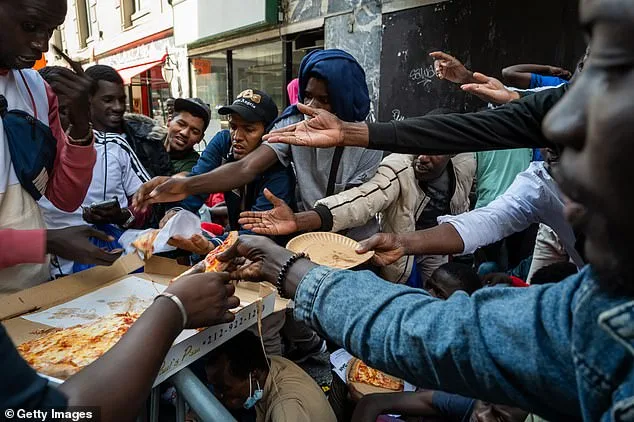
Meanwhile, New York’s leaders have been accused of fuelling teen violence by refusing to reverse the city’s controversial 2017 Raise The Age law which prevents anyone under 18 from being prosecuted as an adult.
It’s all a long way from the 1990s when, under Republican Mayor Rudy Giuliani, New York drastically cut raging violent crime by refusing to ignore even minor offences in a policy known as ‘zero-tolerance’ or ‘Broken Windows’.
Perhaps no issue better illustrates the muddled wokery of New York’s leadership than its implementation of the state’s 2021 decision to legalise cannabis for recreational use.
Proponents of decriminalising weed justify it on the grounds that black people are disproportionately prosecuted and imprisoned for marijuana offences. While that is true, unlike other states which have already legalised it, New York decided that, as a reparation for this historic ‘injustice’, the first licences to sell the drug legally would go almost exclusively to people who had previously been convicted of cannabis offences or their relatives.
This bizarre stipulation has had dire consequences. Few New Yorkers who qualified had the resources or indeed the desire to apply for licences, with the result that there are still only 20 legal cannabis shops in a state of 20 million people.
So why does New York reek of the drug — something rapidly noted by every visitor to the city? Because the gap in the market has inevitably been filled by hundreds of unlicensed cannabis shops, which the authorities have failed to close down. These outlets sell untested and untaxed marijuana products, such as pre-rolled joints and weed-infused sweets.
Tattoo parlours, hair salons and even an opera house have all been found to be selling the drug illegally in a weed free-for-all in which customers are unable to distinguish between licensed and unlicensed retailers.
Consequently, all those millions of cannabis tax dollars New Yorkers were promised by the legalisation cheerleaders . . . they have yet to materialise. The education sector is crumbling, too. New York’s Democrat leaders cite systemic racism as the cause of black and hispanic children performing less well at school than their white peers.
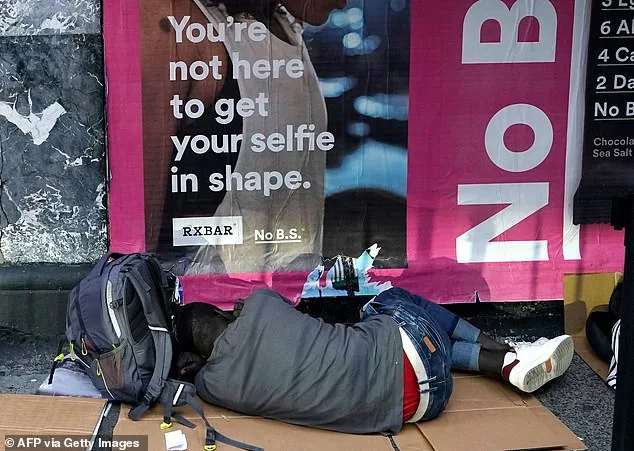
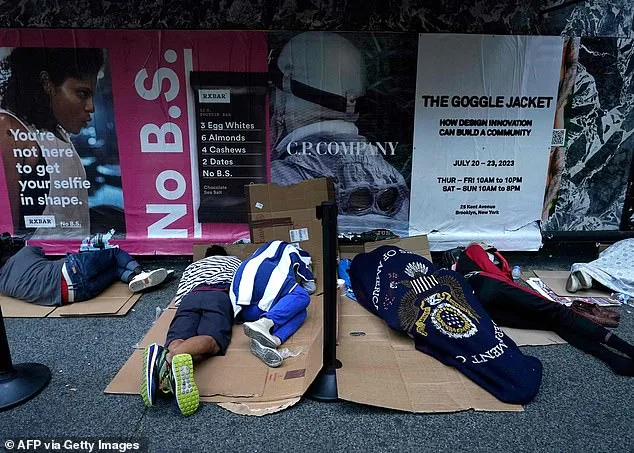
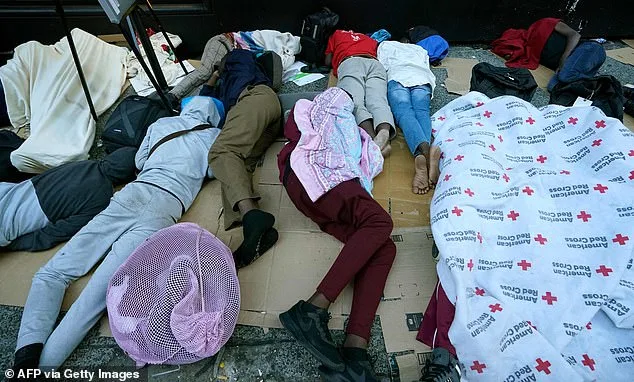
The state’s public education system is governed by a Board Of Regents packed with hardline Left-wingers. This board’s current bogeyman is standardised testing — the equivalent of the UK’s GCSE and A-levels — on the grounds it is racist, as poor black and Hispanic children cannot be expected to perform on an equal footing with wealthier white children.
But what of Asian children, say opponents, who also come from low-income backgrounds but tend to perform very well? Before he took office last year, Mayor Adams also pledged that ‘New York will no longer be anti-business’, a jab at his uber-progressive but ineffectual white predecessor Bill de Blasio, who was fond of quoting Karl Marx’s Communist Manifesto and the works of Cuban Communist pin-up Che Guevara.
The jury is still out on whether Adams, who is — after all — a Democrat with a yen for virtue-signalling, will deliver on making the city more business friendly and prosperous, but the signs are hardly encouraging.
A record 94 million sq ft of Manhattan’s office space is vacant, which is bad news not only for the city’s tax coffers but for the many businesses, including shops and restaurants, that rely on office workers for much of their trade.
Adams’s ability to shake things up is limited by the fact he has to share power with New York state’s Left-wing governor Kathy Hochul, who is widely seen as inept. She spent no less than $2million on consulting firms and professional speech writers to help put together her annual State Of The State address, which set out her agenda for this year.
Yet Left-wingers happily indulge Hochul as she pushes through reams of right-on legislation, including classifying racism as a ‘public health crisis’, launching a free healthcare programme for sex workers and requiring New York estate agents to undergo two hours of ‘implicit bias training and understanding’ and another two hours ‘training in cultural competency’ before renewing their professional licences.
Indeed, it’s rare to find a business sector in New York that isn’t weighed down by such bureaucratic wokery.
A few weeks ago, a new law — believed to be the first of its kind in the world — forced all New York businesses using artificial intelligence to recruit staff to demonstrate their systems are free from racism and sexism.
They must also pass an audit by a third-party company which, naturally, the businesses will have to pay for.
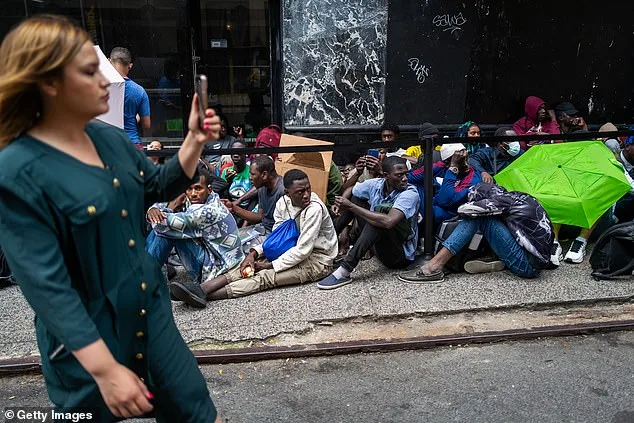
New Yorkers love to look down on California as the spiritual home of half-baked, Leftie ideas but in some areas they’ve even overtaken the West Coasters.
California is backing away from slavery reparations (compensatory payments by government to the descendants of slaves) after a task force commissioned by Governor Gavin Newsom put forward a deal that could cost a ludicrous $800 billion.
Undeterred, New York is pushing ahead with its own reparations plan, purportedly to curb health and wealth disparities between black and white New Yorkers.
Even Los Angeles has yet to declare fat people as a protected group along with racial minorities and religions.
But New York did so a month ago, making it illegal for employers and landlords to discriminate against anyone based on their weight or height.
The legislation was enthusiastically backed by self-styled ‘Fat Fab Feminist’ Victoria Abraham who argued that such people are an oppressed minority, despite the fact that nearly 43 per cent of American adults are obese and nearly three-quarters overweight.
Many New York businesses are dismayed, predicting it will empower the overweight to, as one critic put it, ‘sue anyone and everything’ — from theatres to restaurants — where the over-sized may find it harder to get to their seats.
Poor schools, rampant crime, high taxes, restrictive business regulations, rancorous streets: it’s hardly surprising that the city which prides itself on being the world’s greatest is suffering from a popularity problem.
Demographics experts confidently predicted the exodus from U.S. cities during the pandemic would reverse itself, but between July 2021 and July 2022, 300,000 more people left New York state than moved in — the largest population loss of any state.
Worryingly for business leaders, many of the higher-earning emigres have moved to Republican-run states such as Florida and Texas, where taxes and business regulations are less oppressive.
Some experts argue that the parlous state of New York amounts to a wonderful opportunity for London.
After all, there has never been a better time for the City — the Big Apple’s great rival for the crown of world financial HQ — to capitalise on its woes.


